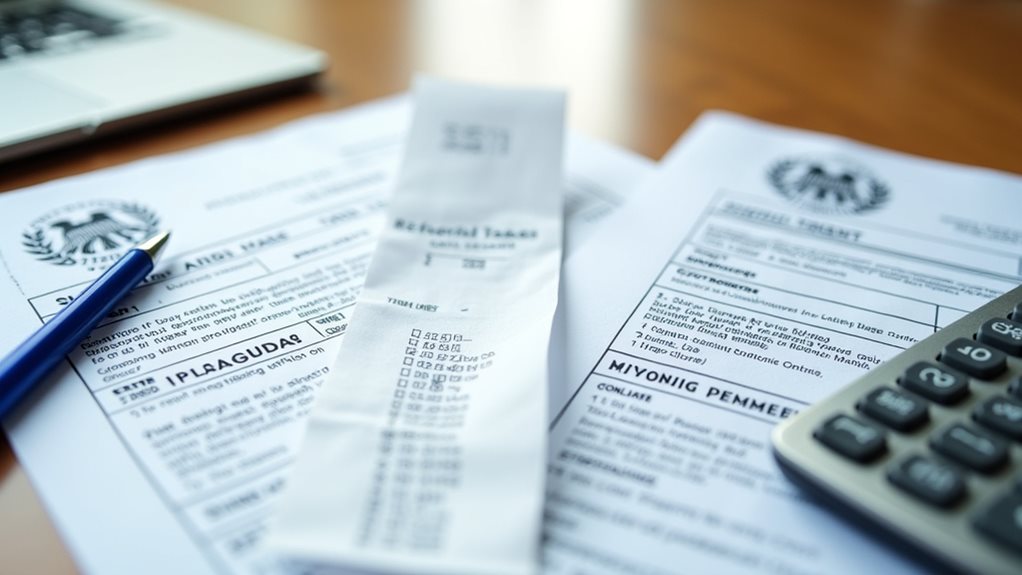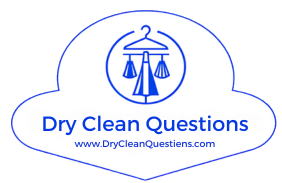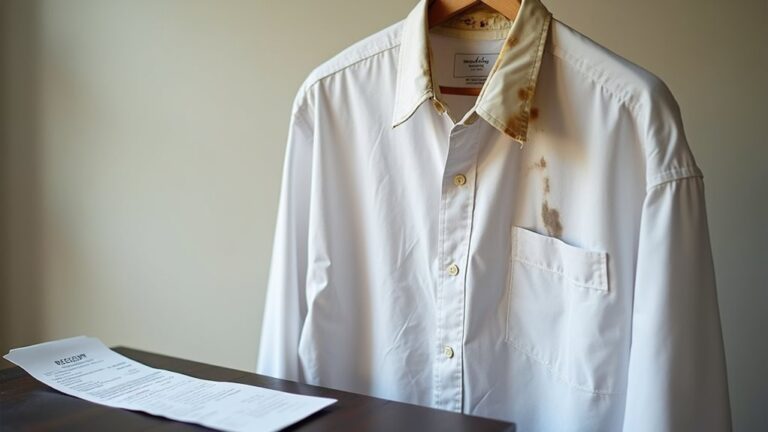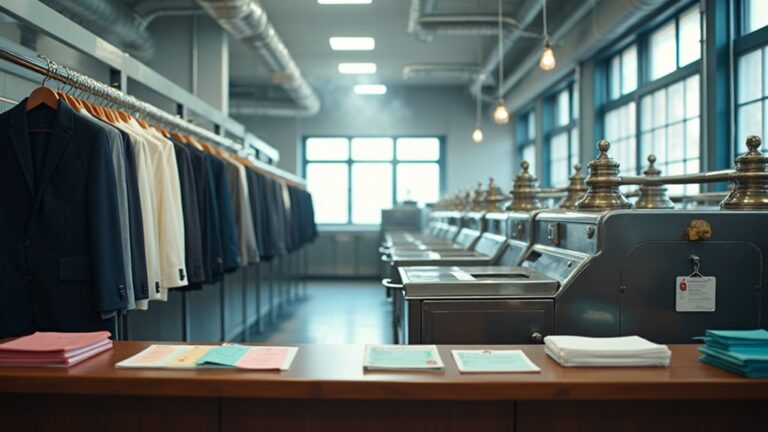You can write off dry cleaning expenses, but honestly, it’s trickier than most people think – your everyday business suits and professional attire won’t qualify under IRS rules. The clothing must be required by your employer, completely unsuitable for street wear, and used exclusively for work, which means uniforms like scrubs, chef coats, or safety gear typically make the cut. If you’re self-employed, you’ll have more flexibility, and there’s plenty more to uncover about documentation requirements and state-specific rules.
Understanding Dry Cleaning Tax Deduction Rules
Although maneuvering through tax deduction rules can feel like deciphering a foreign language sometimes, understanding when you can write off dry cleaning expenses doesn’t have to leave you scratching your head in confusion.
Here’s the reality: if you’re an employee, you can’t deduct dry cleaning costs on your federal return right now, thanks to tax law changes that suspended this benefit until 2026.
However, if you’re running a small business or working as a self-employed professional, you’re in luck – those dry cleaning expenses for work-specific clothing can still count as legitimate tax deductions.
Small business owners and self-employed professionals can still deduct dry cleaning costs for qualifying work-specific clothing.
The key lies in proving your clothing meets strict IRS criteria: employer-required, unsuitable for street wear, and exclusively work-related.
To claim these deductions successfully, you’ll need to maintain detailed receipts and records that demonstrate your clothing’s exclusive work-related purpose and compliance with IRS requirements.
Qualifying Tests for Work Clothing Deductions

You’ll need to pass three specific tests before claiming any dry cleaning deductions for work clothes, and trust me, the IRS doesn’t give you partial credit if you only nail two out of three 😅.
First, your employer must actually require the clothing or it must be crucial for your self-employed work.
Then the garments can’t be something you’d realistically wear to grab coffee with friends on Saturday morning.
Finally, you must commit to keeping these items strictly in your work wardrobe, because the moment you wear that uniform polo to the grocery store, you’ve basically waved goodbye to your deduction eligibility.
Keep in mind that if you’re an employee, you’ll also need to meet the 2% adjusted gross income threshold for miscellaneous itemized deductions, though these deductions have been eliminated for tax years 2018-2025.
Employer Required Clothing
Three specific tests determine whether you can deduct dry cleaning expenses for work clothing, and I learned this the hard way when the IRS rejected my deduction for those expensive suits I thought were “obviously” work-related.
The first test requires your employer to mandate specific clothing, meaning you can’t just decide your work clothes are deductible because they look professional.
When I consulted a tax professional after my audit nightmare, she explained that voluntary dress codes don’t count—your employer must explicitly require the clothing.
If you’re self-employed, you must prove the clothing is crucial for your business operations.
Without this employer requirement or business necessity, you can’t deduct the cost of cleaning, no matter how work-specific you think your attire is.
Remember that regular business clothing that can be worn in personal settings typically won’t qualify, but specialized work attire that cannot be worn outside of work may be eligible for deduction.
Unsuitable for Street Wear
Even when your employer explicitly requires specific clothing, you’ll still hit a wall with the IRS if that attire could reasonably be worn outside of work.
This became painfully clear when I tried to deduct the cleaning costs for my required black slacks and white button-down shirts.
The tax code demands that work clothing pass the “suitability test” – basically asking whether you’d wear those clothes to grab coffee or meet friends.
If the answer’s yes, you can’t deduct those dry cleaning expenses, no matter how much your boss insists on that specific outfit.
Think mechanic’s coveralls versus business casual – one screams “work only” while the other whispers “weekend brunch ready,” making all the difference for your deduction eligibility.
Even without receipts for smaller amounts under $75, you’ll need to maintain detailed logs showing the business purpose, date, and amount to satisfy the burden of proof requirements during potential audits.
Work-Only Usage Rule
While mastering the first two hurdles feels like a victory lap, the IRS throws one final curveball that’s tripped up countless taxpayers: your work clothes must stay strictly in the work zone, never crossing into your personal wardrobe rotation.
Here’s what makes this rule particularly challenging:
- Zero personal use allowed – Even wearing your specialized clothing to grab coffee after work disqualifies the entire deduction.
- Documentation matters – You’ll need to prove these items never leave the work setting through receipts and usage records.
- Mixed-use items fail – If you can reasonably wear something outside work, you can’t deduct it, regardless of employer requirements.
This strict boundary protects legitimate business expenses while preventing abuse. Healthcare workers cleaning their specialized safety gear often qualify for these deductions since such items cannot reasonably be worn in everyday situations.
Examples of Eligible Work Attire and Uniforms

When I first started working in healthcare, I learned the hard way that my scrubs weren’t just a fashion choice – they were actually a legitimate tax deduction because they’re required uniforms that nobody would wear to grab coffee with friends ☕.
You’ll find that many industries have specific clothing requirements that qualify for deductions, from construction workers who need steel-toed boots and hard hats, to chefs who must wear those distinctive white jackets and checkered pants that scream “professional kitchen.”
The key is understanding that these items serve a mandatory purpose for your job safety or employer requirements, making them eligible for write-offs when you need them professionally cleaned.
However, it’s important to note that regular business suits and everyday professional attire typically don’t qualify for dry cleaning deductions since they can be worn outside of work settings.
Industry-Specific Uniform Requirements
Because different industries have vastly different requirements for work attire, understanding what qualifies as a deductible uniform can feel like maneuvering through a maze where the rules change depending on your profession.
Your professional appearance standards vary dramatically whether you’re scrubbing in for surgery or patrolling city streets at midnight.
Here’s what makes deductible uniforms stand out across industries:
- Healthcare workers need scrubs that meet strict hygiene protocols, making these work attire pieces unsuitable for weekend grocery runs.
- Law enforcement officers wear specialized uniforms with badges, patches, and equipment attachments that scream “official business only.”
- Mechanics require coveralls designed to protect against grease and chemicals, clearly not appropriate for casual dining 🔧
Each profession’s unique demands create natural boundaries that help determine legitimate deduction opportunities.
The IRS considers uniforms and specialized work clothing that cannot be worn for everyday use as necessary business expenses, making their dry cleaning costs deductible.
Safety Gear Deductions
Safety gear takes workplace clothing deductions into an entirely different territory, where your hard hat, steel-toed boots, and flame-resistant coveralls aren’t just protecting your body—they’re also protecting your wallet come tax time.
Unlike regular business attire that you might wear to dinner, professional safety gear serves one purpose: keeping you alive at work. The IRS recognizes this distinction, allowing deductions for specialized equipment that construction workers, firefighters, and emergency responders need daily.
Your safety goggles, protective gloves, and mandatory uniforms qualify as legitimate business expenses when they’re exclusively work-related and unsuitable for everyday wear.
Even better, you can deduct cleaning and maintenance costs for this gear, making workplace safety more affordable.
Keep detailed records of all safety gear purchases and cleaning expenses to support your deductions, as proper documentation requirements are essential for IRS compliance.
Federal Vs State Tax Treatment Differences

Although the federal tax government suspended employee deductions for dry cleaning expenses through 2025, maneuvering the tax environment becomes more complex when you consider that state governments often march to their own drummer.
Some states didn’t conform to federal restrictions, creating opportunities you might’ve overlooked.
Here’s what you need to know about state versus federal tax treatment:
- State independence: Certain states maintained their own dry cleaning deduction rules, ignoring federal suspension entirely.
- Small businesses advantage: Self-employed individuals can still claim qualifying clothing costs under specific state laws.
- Research requirement: You’ll need to check your specific state tax code, as rules vary dramatically across jurisdictions.
Remember that specialized uniforms and work-specific attire that cannot be worn for everyday purposes may still qualify for deductions, making proper documentation crucial for any eligible claims.
The key lesson? Don’t assume federal tax rules automatically apply to your state return – sometimes local regulations offer unexpected benefits!
Self-Employed Vs Employee Deduction Options

When you’re maneuvering the maze of dry cleaning deductions, your employment status becomes the determining factor that’ll either open doors or slam them shut.
Honestly, I learned this the hard way during my first year of freelance consulting. As a self-employed individual, you can deduct dry cleaning expenses on your tax return for specialized work clothing, protective gear, and uniforms that aren’t suitable for everyday wear – think chef coats, medical scrubs, or safety equipment that requires professional cleaning.
However, if you’re an employee, those same deduction opportunities vanish until at least 2026 due to federal suspensions. It’s frustrating, but that’s the reality we’re working with right now. 📊
Remember that maintaining detailed records and receipts for any claimed dry cleaning deductions is crucial for compliance with IRS regulations.
Proper Classification and Documentation Requirements

Because I once faced a nightmare audit over a $47 dry cleaning receipt that I’d carelessly labeled as “business expense” without proper documentation, I can’t stress enough how essential it’s to get your classification and paperwork right from the start.
The IRS doesn’t mess around when it comes to distinguishing between your personal polo shirts and legitimate work uniforms.
Here’s what you absolutely need to nail down:
- Keep detailed receipts that clearly show the dry cleaning costs, dates, and specific items cleaned.
- Document the business purpose by noting which garments qualify as uniforms or specialized work attire.
- Maintain organized records for at least three years, because auditors love digging into poorly documented expenses.
Trust me, proper documentation saves you from explaining wardrobe choices to skeptical tax officials! 😅
Common Mistakes to Avoid When Claiming Deductions

Since I’ve witnessed countless taxpayers stumble into the same traps year after year, let me walk you through the most devastating mistakes that can turn your perfectly innocent dry cleaning deduction into an IRS red flag.
First, you can’t claim the deduction for everyday business attire, even if it requires dry cleaning – those tax implications will bite you during an audit.
Second, throwing away receipts is financial suicide; proper documentation protects your deductions when the IRS comes knocking.
Third, assuming your employer “requires” professional dress doesn’t automatically qualify your expenses. Costs related to general work clothing rarely pass IRS scrutiny unless they’re true uniforms unsuitable for street wear.
Finally, don’t assume federal and state rules match – some states still allow deductions that federal law prohibits! 📝




